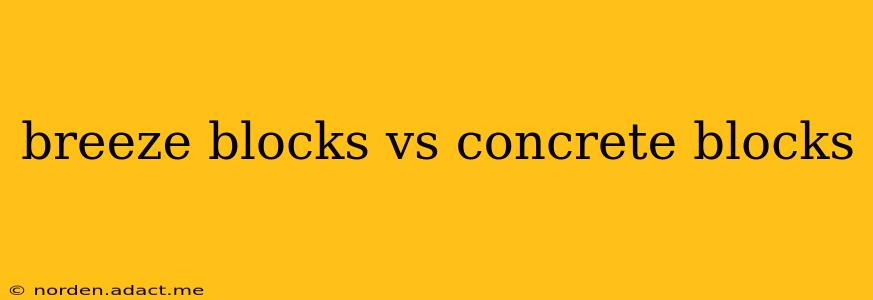Choosing the right building block can significantly impact the aesthetics, functionality, and cost of your construction project. This detailed comparison of breeze blocks and concrete blocks will help you make an informed decision. We'll explore their key differences, highlighting the pros and cons of each to guide you towards the best choice for your specific needs.
What are Breeze Blocks?
Breeze blocks, also known as aircrete blocks or cellular concrete blocks, are lightweight concrete blocks containing numerous small holes or voids. These voids reduce the overall weight and density of the block, leading to several key advantages. They are typically made from a mix of cement, sand, and a foaming agent.
What are Concrete Blocks?
Concrete blocks, or cinder blocks, are solid or partially hollow masonry units made from a mixture of cement, aggregates (like sand and gravel), and water. They are denser and heavier than breeze blocks and offer different properties for construction.
Breeze Blocks vs. Concrete Blocks: Key Differences
Here's a breakdown of the main differences between breeze blocks and concrete blocks:
Weight and Density:
- Breeze Blocks: Significantly lighter and less dense due to the numerous air pockets. This makes them easier to handle and transport, reducing labor costs.
- Concrete Blocks: Heavier and denser, requiring more robust handling and potentially increasing labor costs.
Strength and Durability:
- Breeze Blocks: Generally less strong and durable than concrete blocks, making them unsuitable for load-bearing applications without reinforcement. They are more prone to cracking under significant stress.
- Concrete Blocks: Offer superior strength and durability, making them ideal for load-bearing walls and structures. They can withstand heavier loads and are more resistant to damage.
Thermal Performance:
- Breeze Blocks: Excellent thermal insulation properties due to the air pockets. This can lead to energy savings by reducing the need for heating and cooling.
- Concrete Blocks: Offer less thermal insulation than breeze blocks, resulting in potentially higher energy costs for heating and cooling.
Sound Insulation:
- Breeze Blocks: The air pockets offer some degree of sound insulation, though not as effective as specialized acoustic blocks.
- Concrete Blocks: Provide better sound insulation than breeze blocks, particularly the solid varieties.
Cost:
- Breeze Blocks: Generally less expensive than concrete blocks due to their lower material density and manufacturing process.
- Concrete Blocks: Typically more expensive due to higher material density and manufacturing costs.
Aesthetic Appeal:
- Breeze Blocks: Their porous nature allows for light and air to pass through, creating a unique aesthetic, often used in decorative or partition walls.
- Concrete Blocks: Often have a more utilitarian appearance, though finishes and textures can enhance their aesthetic appeal.
Frequently Asked Questions (FAQs)
Here we address some common questions about breeze blocks and concrete blocks based on online searches:
Are breeze blocks stronger than concrete blocks?
No, concrete blocks are significantly stronger and more durable than breeze blocks. Breeze blocks are better suited for non-load-bearing applications.
Which is better for soundproofing, breeze blocks or concrete blocks?
Concrete blocks offer better soundproofing capabilities than breeze blocks. However, for optimal sound insulation, specialized acoustic blocks might be necessary.
Which is cheaper, breeze blocks or concrete blocks?
Breeze blocks are generally cheaper to purchase and install due to their lower weight and ease of handling.
Which is better for thermal insulation, breeze blocks or concrete blocks?
Breeze blocks offer superior thermal insulation due to the presence of air pockets within the block.
Can breeze blocks be used for load-bearing walls?
Breeze blocks are typically not suitable for load-bearing walls unless reinforced with steel or other strengthening materials.
Conclusion: Making the Right Choice
The choice between breeze blocks and concrete blocks depends heavily on your project's specific requirements. For applications requiring high strength and load-bearing capacity, concrete blocks are the clear winner. However, if thermal insulation, lower cost, and ease of handling are priorities, breeze blocks are a viable and often preferable option, particularly for partition walls, garden walls, or other non-load-bearing structures. Always consult with a qualified builder or structural engineer to ensure you make the best choice for your specific project.
